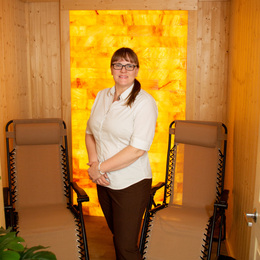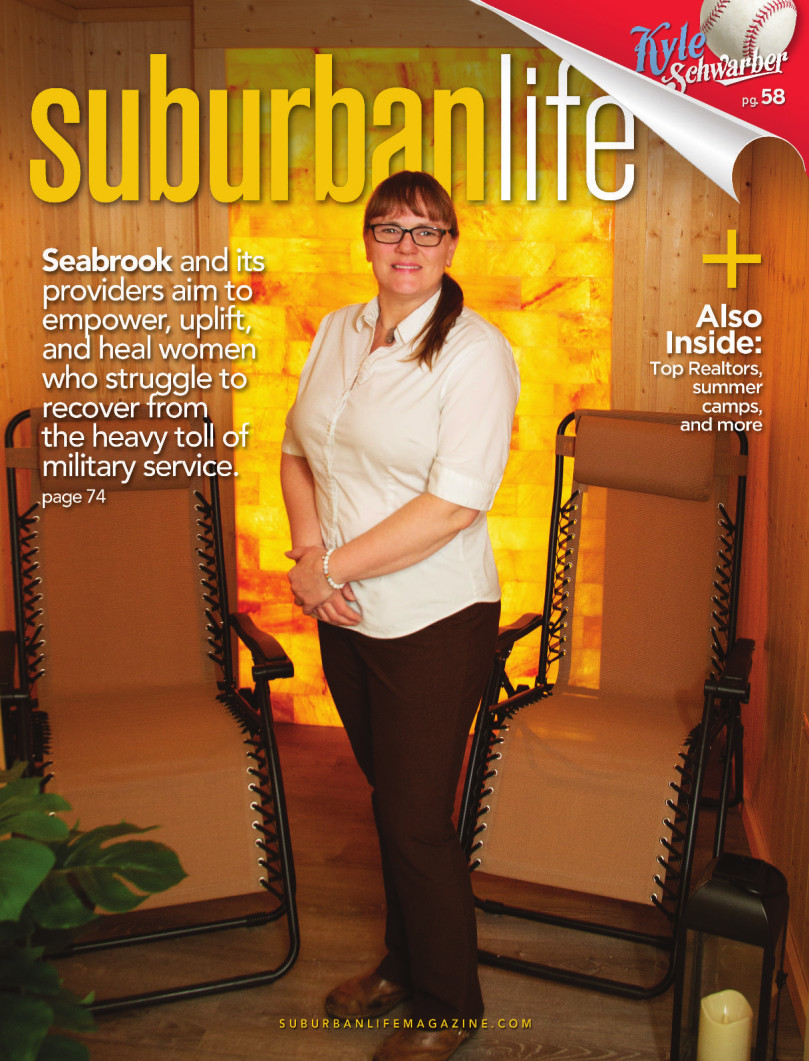
Healing Women Warriors
Seabrook’s new treatment program aims to empower, uplift, and heal women who struggle to recover from the heavy toll of military service.
Theressa Barrett went to college to become a teacher, but life steered her toward the military. She joined the U.S. Air Force in the early 1990s, and became a heavy-equipment mechanic. Stationed at Andrews Air Force Base in suburban Washington, D.C., she also served in Saudi Arabia as part of Operation Desert Storm and spent another year in South Korea.
After her military service concluded in 2000, Barrett essentially reinvented herself as a civilian through training and education. Her time in uniform left an indelible mark on her.
“I had memorable experiences and not-so-memorable ones,” she says. “It wasn’t always glamorous, being a mechanic and being a woman. Sometimes, when life slows down, I realize I have more memories of things that I haven’t quite dealt with yet.”
Barrett’s experience echoes that of many women who choose to enlist. While military service certainly offers many benefits, it also has the potential to leave deep wounds, not all of which are visible. Women in uniform often face unique challenges compared with their male counterparts; some experience degrees of mental and physical trauma, including sexual trauma, and the military is not wholly equipped to help them heal. To make matters worse, the mounting burden of these experiences tends to predispose many servicewomen to the vicious cycle of addiction.
As a result, women who have pledged to defend their country often come away from the experience not knowing who they are or where they fit in as civilians. Many also struggle to cope with the profound harm they encountered, from which not even the strongest body armor could protect them. They feel vulnerable, misunderstood, and alone—even forgotten.
The scope and severity of this phenomenon compelled the leadership of Seabrook to act. Seabrook, which provides co-occurring addiction-treatment services with multiple locations throughout New Jersey, has created a whole-health program designed to “fill the clinical gap” and address the precise needs of this population. As Seabrook began to shape the program, veterans such as Barrett provided invaluable feedback that informed practitioners’ understanding.
“Unlike Theressa, a lot of female veterans don’t get the help they need, because they don’t seek it out,” adds Adrian Dourte, DACM, Doctor of Chinese Medicine and acupuncturist with Seabrook. “Women are often treated as the lesser sex, and that in itself can be traumatizing. That’s why we hire only female staff to work with female veterans, to provide that safe space. We also make sure that all our staff understand the specific needs of these women.”
Enter RanDee McLain Malone, LCSW, the national advisor of strategic projects and initiatives for PsychArmor, a nonprofit organization dedicated to improving health and life outcomes for military-connected individuals. PsychArmor has collaborated with Summit BHC, Seabrook’s parent company, to create Seabrook’s Tactical Recovery program.
PsychArmor has helped Seabrook foster a culturally competent and trauma-informed environment, with evidence-based care tailored to each individual. The goal: to promote recovery and wellness amongst veterans, particularly the subpopulation of female veterans. PsychArmor has created training modules for all Seabrook staff, from those who provide direct care to those in support roles.
“In order for a woman to succeed in the military, she almost has to depersonalize the experience,” McClain Malone says. “You’re a solider, sailor, or airman for a period of time, and then you’re thrust back into civilian life, and a lot of people struggle to acclimate. Many times women are also caregivers and mothers and partners, so they’re also trying to juggle careers, relationships, and other obligations. All that is on top of any gender-specific trauma they might have endured in the military, and even in civilian life.”
McClain Malone is a veteran of the U.S. Navy who felt inspired to serve her country after Sept. 11, 2001. She recalls her military career as a “good and positive experience,” though she did not emerge unscathed. Besides injuring her back and knee in a fall from an armored vehicle, she endured other kinds of trauma that left scars one cannot see or touch.
“Most women in the military want to fit in and prove they deserve to be there, so they tend to drink more [alcohol] than they would otherwise,” McLain Malone adds. “You also see a lot of self-medicating to deal with all the stressors. You’re not really taught about healthy coping mechanisms. Nobody teaches you how to come home from war or deal with the other kinds of trauma you might experience along the way.”
Her best advice to any military-connected woman who finds herself struggling: “Take it one day at a time and don’t be afraid to reach out. There are amazing resources out there; you just have to be willing to ask for [help]. You don’t have to go through this alone.”
At Seabrook’s campus in Bridgeton, New Jersey, servicewomen find a safe, soothing, and idyllic environment where they can heal in mind, body, and spirit. The 44-acre campus includes a labyrinth, gardens, and fountains, while indoor treatment areas include healing therapies such as a newly added salt room designed to boost the immune system and calm the mind. The whole-health treatment program blends Eastern and Western medicine to treat each patient uniquely and holistically.
“Eastern and Western medicine work amazing together,” Dr. Dourte adds. “Where Western medicine may not be able to help with all withdrawal symptoms, things like massage and yoga and acupuncture play a part in helping patients find more relief. The goal is to help the veterans reconnect with their body, where trauma is stored, in order to effectively resolve and restore them to a state of wholeness. It is the disconnect that perpetuates addiction and other dysfunctional cycles of behavior.
“Some people who come out of the military don’t come out with PTSD, while for others it completely interrupts their life,” she continues. “The good thing is that the brain is trainable. Something like EMDR (eye movement desensitization and reprocessing) can get someone into a relaxed state so they can talk about the trauma they experienced, and reset the body to always be in a relaxed state when they relive it. It’s a matter of restoring balance to heal the mind and body.”
Seabrook strives to make each patient feel understood, heard, and “seen” as an individual. In addition, various modalities of therapy can address the precise physical, mental, and emotional issues that may be preventing a female veteran from moving forward with her life.
“We’re working collaboratively with the veterans to find out what works best for each person,” Dr. Dourte adds. “If you’re here, you’ve gotten to a point where drugs and alcohol have become your medication. When you leave here, you’re going to have a whole toolbox of things to help you move forward that don’t include drugs and alcohol.”
Considering its whole-health focus, the program aims to support each servicewoman’s mental health and physical well-being, with lessons in self-care designed to help her live happily and healthfully once she returns home. In other words, Seabrook wants each female veteran who completes the program to emerge with the tools she needs to discover a sense of purpose, reconnect with the aspects of her life that matter the most, and reengage with the world.
Whether it is MST, combat trauma, or childhood experiences that were recapitulated in the military, Seabrook is proud to offer programming powered by science. Evidence-based practices combine individualized patient experiences and values with clinical experience and research for optimal outcomes in wellness. Recovery is possible, and no woman has to go through it alone.
For more information on Seabrook and its locations throughout New Jersey, call (800) 761-7575 or visit seabrook.org.
Photo by Alison Dunlap
Published (and copyrighted) in Suburban Life magazine, March 2023.



